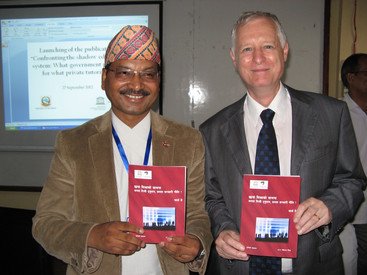Out of the Shadows
Private supplementary tutoring has become ubiquitous in Hong Kong, and is increasingly visible elsewhere. It is widely called "shadow education" because it mimics regular schools. As the curriculum in the schools changes, so it changes in the shadow. The intention may be to help students keep up or get ahead, but shadow education has implications for education systems as a whole – and for social equity.
Private supplementary tutoring has become ubiquitous in Hong Kong, and is increasingly visible elsewhere. It is widely called "shadow education" because it mimics regular schools. As the curriculum in the schools changes, so it changes in the shadow. The intention may be to help students keep up or get ahead, but shadow education has implications for education systems as a whole – and for social equity.
Professor Mark Bray has been researching the practice around the world and has brought it to the attention of governments and policy-makers.
He published a book on shadow education through UNESCO in 2009. It showed that private supplementary tutoring – previously thought to be a problem confined to East Asia – was increasingly evident in other parts of Asia, as well as Europe, North America and Africa. The book has been translated into 18 languages and has become a wake-up call to governments.
"The shadow education system is huge," he says. "It's gobbling up a lot of money and both maintaining and exacerbating inequalities."
"People who are rich can have a lot of tutoring. Middle-income families then feel they should get it too. And then the low-income groups feel they had better join to avoid being left out of the race. There are major contractions in societies which claim to have free education for all." Mark Bray argues that the shadow education system must be confronted, not left to evolve unchecked.
"With this book, people are able to put shadow education on the table and see that other places have this problem, too. It facilitates conversation in a way which can take some of the defensiveness out of the issues."
Professor Bray has been invited to be part of that conversation, giving presentations on five continents and being commissioned by the European Union and Asian Development Bank to do follow-up studies in their regions. With colleagues he is also working with the Dubai government and with the League of Arab States in Cairo. Closer to home, he is running a major research project, collecting data from - and exploring the implications with - 16 secondary schools.
At HKU in May 2012 Mark Bray was appointed UNESCO Chair Professor in Comparative Education. He will use this platform to continue to study implications of shadow education. Between 2006 and 2010 he took leave from HKU to work in Paris as Director of UNESCO's International Institute for Educational Planning. This has given him excellent links within the UNESCO family through which to spread the message.
"The UNESCO Chair will enable me and colleagues to extend our outreach in the international community," he says. "The Chair is putting HKU on the map, and HKU is putting us on the map by encouraging us to do this sort of work."
Professor Mark Bray received the Knowledge Exchange Award 2012 of the Faculty of Education for the project entitled "Confronting the Shadow Education System: What Government Policies for What Private Tutoring?".


